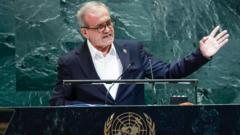Will UN Sanctions Against Iran Return Due to Nuclear Violations?

Published: 2025-09-27 04:15:14 | Category: technology
The reimposition of sweeping economic and military sanctions on Iran by the United Nations marks a significant escalation in tensions regarding its nuclear programme. Following accusations from the UK, France, and Germany about Iran's failure to uphold commitments made under the Joint Comprehensive Plan of Action (JCPOA), these sanctions could again reshape the dynamics of international relations in the Middle East.
Last updated: 22 October 2023 (BST)
Key Takeaways
- The UN is set to reinstate sanctions on Iran after a decade of relief.
- Iran's President denounces the sanctions as "unfair, unjust, and illegal".
- The UK, France, and Germany initiated the process for reimposing sanctions.
- Iran has intensified its nuclear activities since the US withdrew from the JCPOA in 2016.
- Russia and China attempted to delay sanctions but faced limited support.
The Background of the Sanctions
In 2015, the JCPOA was heralded as a landmark agreement, designed to curb Iran's nuclear programme in exchange for lifting economic sanctions. The deal was negotiated under President Barack Obama, aiming to prevent Iran from developing nuclear weapons while allowing it to engage more fully in the global economy. However, in 2018, President Donald Trump unilaterally withdrew the United States from the agreement, asserting that it was flawed and failing to address concerns regarding Iran's regional activities.
Current Developments
In recent weeks, the UK, France, and Germany have expressed their dissatisfaction with Iran's compliance with the JCPOA, prompting them to write to the UN Security Council. This communication triggered a mechanism that gives Iran a 30-day window to address these concerns through diplomacy, or face renewed sanctions. The Iranian government, led by President Masoud Pezeshkian, has condemned the potential sanctions, claiming they are illegitimate and will not deter Iran from pursuing its nuclear ambitions.
Iran's Response to Sanctions
Pezeshkian's rhetoric underscores a deep-seated frustration with Western powers, asserting that Iran will not abandon its commitments under the Non-Proliferation Treaty (NPT). He emphasised the need for assurances that Iran's nuclear facilities would not be targeted, particularly following recent military strikes by Israel and the US on Iranian sites. This insistence highlights the precarious balance Iran seeks to maintain between its nuclear ambitions and regional security concerns.
The Role of the International Atomic Energy Agency (IAEA)
Iran is legally obligated to facilitate inspections by the IAEA, which monitors compliance with nuclear agreements. Following the military strikes this June, there were interruptions in the IAEA's access to Iranian sites. However, inspections have reportedly resumed, allowing the IAEA to assess the status of Iran's nuclear programme. Despite these inspections, Western powers remain sceptical about Iran's claims that its nuclear activities are solely for peaceful purposes.
The Economic Implications of Renewed Sanctions
The reintroduction of sanctions could have dire economic consequences for Iran, which has struggled under previous sanctions. The sanctions would likely affect various sectors, including oil exports, which are crucial for the Iranian economy. The potential loss of access to international markets could exacerbate existing economic challenges, leading to increased domestic unrest.
International Reactions and Future Prospects
Russia and China have expressed their opposition to the reintroduction of sanctions, attempting to delay the process. Their last-minute resolution to postpone the sanctions for six months garnered only four votes in the UN Security Council, illustrating the fractured international stance on Iran. The geopolitical landscape remains complex, with multiple stakeholders involved seeking to influence the outcome of these negotiations.
What Happens Next?
As the 30-day window for diplomatic resolution approaches its end, the international community will be closely monitoring Iran's actions. Should diplomatic discussions fail, the UN sanctions will come into force, followed shortly by EU sanctions. This could lead to a further escalation of tensions in the region and complicate any future negotiations regarding Iran's nuclear programme.
Conclusion
The reimposition of sanctions on Iran is a multifaceted issue that touches on international diplomacy, regional security, and nuclear proliferation. As the situation evolves, the stakes remain high for all parties involved. With ongoing negotiations and the threat of renewed sanctions, what steps will Iran take to navigate this precarious landscape? The coming weeks will be crucial in determining the future of Iran's nuclear ambitions and its relations with the West.
FAQs
What are the main reasons for the reimposition of sanctions on Iran?
The primary reasons include Iran's failure to comply with commitments under the JCPOA, accusations of increasing nuclear activity, and the withdrawal of the US from the agreement in 2018.
What is the Joint Comprehensive Plan of Action (JCPOA)?
The JCPOA is a nuclear agreement reached in 2015 between Iran and six world powers, aimed at limiting Iran's nuclear programme in exchange for the lifting of economic sanctions.
How might renewed sanctions affect Iran's economy?
Renewed sanctions could severely impact Iran's economy, particularly its oil exports, leading to increased inflation, unemployment, and potential social unrest.
What role does the International Atomic Energy Agency (IAEA) play in this situation?
The IAEA monitors Iran's nuclear programme to ensure compliance with international agreements and conducts inspections of nuclear sites to verify the peaceful nature of Iran's nuclear activities.
What are the consequences if Iran does not comply with UN demands?
If Iran fails to comply, the UN sanctions will be reinstated, followed by EU sanctions, further isolating the country economically and politically.



